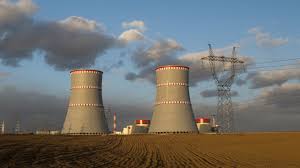At the US-Africa Nuclear Energy Summit (USANES) in Nairobi, Kenya, Nuclear Power Ghana and US nuclear technology project developer Regnum Technology Group reached an agreement to deploy a single NuScale VOYGR-12 small modular reactor (SMR) plant in Ghana.
The two companies plan to form a subsidiary company in the near future to own and operate Africa’s first commercial advanced light-water SMR.
“Signing this agreement will position Ghana as a leader in the deployment of small modular reactors in Africa, catalysing economic development and job creation in the region,” said US Under Secretary for Arms Control and International Security Bonnie Jenkins.
“We are excited by the promise of these technologies in building a more sustainable future.”
The US has been lobbying hard for nuclear business in Africa with significant efforts being made in Ghana.
In March 2022 Ghana joined the US Department of State’s Foundational Infrastructure for Responsible Use of Small Modular Reactor Technology (FIRST) programme, which was launched in April 2021.
“As the US government works with the government of Ghana to lay a strong foundation for a thriving civil nuclear energy sector, US companies are eager to support that ambition every step of the way,” said US Deputy Assistant Secretary Camille Richardson at the time.
What are Small Modular Reactors?
Small Modular Reactors (SMRs) are a type of nuclear reactor that is smaller in size and power output compared to traditional nuclear reactors.
They are designed to be built in factories and then shipped to the site where they will be operated, allowing for easier and faster construction.
However, concerns remain about whether SMRs will become commercially widespread.
Ghana believes nuclear power can help it achieve its industrial ambitions while fighting climate change.
According to Aleshia Duncan, deputy assistant secretary for international cooperation at the U.S. Department of Energy, “Ghana and many other African countries are pursuing nuclear energy to achieve their economic development, energy security, and decarbonization goals,”
“It’s imperative that the United States remain a strong and engaged partner, offering technical expertise and resources to ensure the successful deployment of nuclear energy across the continent.”
In April 2024, Nuclear Power Ghana and CNNC Overseas Limited signed a cooperation and framework agreement on the margins of the 26th World Energy Congress in Rotterdam for the construction of a HPR-1000 (Hualong One) Nuclear Power Project and the upgrade of Ghana’s grid.
President Joe Biden’s administration sees nuclear energy as a crucial tool in the battle against climate change, as it generates power with virtually no emissions. Nuclear power, despite its benefits, produces long-lasting nuclear waste.
NuScale is currently the only company licensed to build a U.S. Small Modular Reactor (SMR), but last year it cancelled its sole U.S. project due to escalating costs.
Other major players vying for the contract to build Ghana’s nuclear plant included France’s EDF and the China National Nuclear Corporation, according to an energy ministry official in May.
Developers interested in the Ghana’s First Nuclear Power Project
South Korea’s Kepco, alongside its subsidiary Korea Hydro Nuclear Power Corporation, as well as Russia’s ROSATOM, were also in the race for the decade-long project.
Africa’s nuclear energy ambitions face significant challenges as experts question whether the continent’s infrastructure can support such a leap. Industry leaders from the US and Africa’s nuclear energy sector are meeting in Nairobi this week to discuss how to move forward.
The four-day conference aims to address the obstacles hindering the adoption of nuclear energy on the continent.
While South Africa remains the only African nation with nuclear power plants, Kenya and Rwanda are eager to follow.
This summit is the second major convention on the issue, following a similar event in Accra, Ghana, in October-November 2023. That event was organised by the US Department of Energy in collaboration with the Nuclear Power Institute of the Ghana Atomic Energy Commission.
In 2022, Russia and Ghana agreed to establish a Joint Working Group to coordinate and exchange information regarding Russian technological solutions for SMRs during a seminar on SMR technology in Accra organised within the framework of nuclear energy cooperation between Russia and Ghana.
Feasibility in Question
Experts are questioning the feasibility of building nuclear power plants in Africa.
“There is a lot of talk about nuclear programmes in Africa, but these ideas are closer to fantasy than industrial reality,” said Mycle Schneider, project coordinator at the World Nuclear Industry Status Report (WNISR).
The first major obstacle, he told RFI, is the size of grids.
The Intrnational Atomic Energy Agency states that an average large nuclear reactor is around 1,000 megawatts (MW) or one gigawatt (GW). However, only four African countries have a grid larger than 10,000MW or 10GW – Algeria, Libya, Morocco and Nigeria. Most other African nations have much smaller grids.
“Kenya’s grid is about 3.3GW, so the largest unit should be around 300MW, which is much less than a large nuclear reactor,” Schneider said.
“In Rwanda, the total national grid is 300MW. So we’re in a situation where an ordinary nuclear power plant would absolutely not have the grid size needed in most African countries.”
Schneider argues that African countries need decentralised energy production systems, a mix of renewable energy and power systems that can be built quickly, unlike nuclear power plants.
Also read: Africa’s First Nuclear Energy Training Hub Launched in Accra, Ghana
El Dabaa Nuclear Power Plant (NPP), the first nuclear power plant in Egypt

Leave a Reply